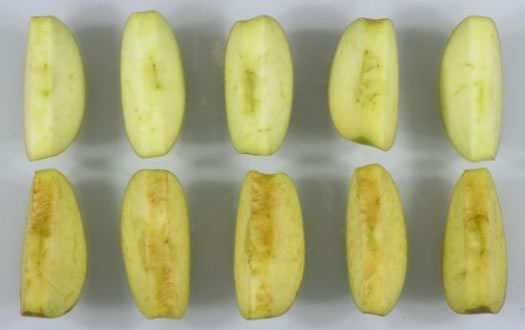Genetically modified apples move closer to production

The top row are "Arctic" Granny Smith apples, and the bottom are traditional Granny Smith. / photo: Okanagan Specialty Fruits
Arctic apples -- the apples genetically modified so they don't brown when exposed to air -- have cleared one of their last regulatory hurdles, the US Department of Agriculture announced Friday. [Politico] [USDA]
Okanagan Specialty Fruit -- the company that developed the apples -- is projecting that small test-market quantities of its non-browning Golden Delicious and Granny Smith apples will available by 2016.
The technology used to create the apples is called gene silencing. Basically what Okanagan has done is target genes in the apple that are responsible for producing an enzyme involved in apples browning, and turned those genes off. The company says it's able to silence these genes very specifically. (Here's a skeptical perspective on the precision of the targeting.)
The commercial idea here is that non-browning apples will open up more opportunities for sliced apple snacks, and reduce food waste.
As you know, New York is the second largest producer of apples in the United States. Hearst reported last fall that Arctic apples were being tested at an undisclosed location upstate. Apple growers associations, both national and here in New York, have been skeptical of the genetically modified apples, not so much because of safety concerns but because of worries about how the public will perceive the apples -- essentially, apples already have a rep for being healthy and wholesome, so why do anything that could potentially mess with that. [Hearst/TU] [Modern Farmer]
Scientific organizations such as the American Association for the Advancement of Science have concluded the available evidence indicates that genetically modified food is safe. But there's a big gap between what scientists tend to think about the topic and where many people in the general public tend to stand on it, as a recent Pew Research Center report illustrated.
The topic of genetically modified food tends to get some people really fired up. It's a complicated topic, and if you're looking to read up on it, this Grist series is a good place to start.
A little bit more to read: The tension over genetically modified food has also involved oranges, but the situation there is much different compared to apples. Citrus growers in Florida are facing the possibility of their entire industry being wiped out by a disease called citrus greening. And that's prompted citrus growers to look toward the development of transgenic disease-resistant fruit as a possible solution. [NYT]
Earlier on AOA: Beyond boring apples
Hi there. Comments have been closed for this item. Still have something to say? Contact us.
Comments
>> The commercial idea here is that non-browning apples will open up more opportunities for sliced apple snacks, and reduce food waste.
So, the belief is that consumers will eat more apples if they can buy them pre-sliced? Slicing an apple shouldn't take more than 20 seconds. What's the value here?
... said Bill on Feb 16, 2015 at 12:58 PM | link
@Bill
I know right?
It's like sliced bread, why would people eat more bread if they can buy it pre-sliced? Slicing bread shouldn't take more than 20 seconds. What's the value there?
Seriously though, people are lazy this has tremendous value.
... said nb on Feb 17, 2015 at 10:33 AM | link
People are lazy and fantastically dumb. Witness: our grocery stores sell the flavorless styrofoam described as various types of "Delicious" (the most ironic name in the history of agriculture), trucked in from across the country, when we live in the one of the greatest apple-growing states in the union. Why? Because that crap ships beautifully, and they don't have to do much with it, whereas real fruit needs to be stored right and can't sit out for weeks. So the grocery stores offer all this horrible, flavorless stuff that we settle for because it's the only thing there, when each week Saratoga Apples offers up fruit at the Troy Farmer's Market that tastes like it just came off the tree.
... said Carl on Feb 17, 2015 at 12:50 PM | link